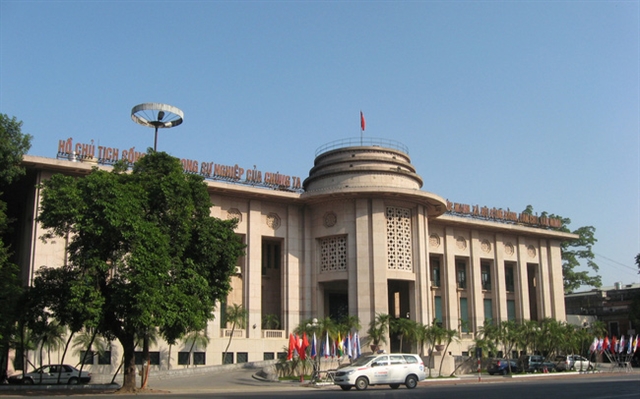 Economy
Economy

The State Bank of Việt Nam (SBV) will soon make a decision on cutting the benchmark interest rate to support the economy amid the COVID-19 outbreak, the bank’s Deputy Governor Đào Minh Tú revealed at a meeting on Thursday.

|
| SBV headquarters in Hà Nội. Experts expect a 0.5 percentage point benchmark rate cut. — Photo SBV |
HÀ NỘI — The State Bank of Việt Nam (SBV) will soon make a decision on cutting the benchmark interest rate to support the economy amid the COVID-19 outbreak, the bank’s Deputy Governor Đào Minh Tú revealed at a meeting on Thursday.
Việt Nam made the last benchmark rate cut by 0.25 percentage points in September 2019.
The reduction of the benchmark interest rate, which would help lower discount, refinancing and open-market-operation (OMO) rates, was a solution to help credit institutions with abundant liquidity, thus put them in a better position to support businesses amid the COVID-19 pandemic, Tú said.
Experts also proposed the Government to cut the benchmark policy rate as many businesses in affected industries and sectors were shrinking production or even closing their doors.
“A benchmark interest rate cut of some 0.5 percentage points should be made to provide a lower interest rate fund for commercial banks, who then can lend to struggling firms at better interest rates,” banking and financial expert Nguyễn Trí Hiếu suggested.
A lower interest rate was very important, especially under the current context when businesses were shrinking production or even closing their doors, and had no capital demands, Hiếu noted.
Central banks of many other countries had so far also taken strong measures, attempting to contain the coronavirus’ economic fallout, Hiếu said, citing the US Federal Reserve recently slashed its interest rates by half a percentage point, its biggest single cut and first emergency rate move in more than a decade since the depths of the 2008 financial crisis, as a pre-emptive move to protect the economy from the coronavirus.
At the meeting, Deputy Governor Tú said that the SBV had yet to consider adjusting the credit growth target because the Government had not adjusted macro-economic objectives. He noted that many banks had launched big credit packages with reduced interest rates to support enterprises and people affected by the epidemic.
According to Nguyễn Quốc Hùng, director of the SBV’s Credit Department, credit institutions have re-scheduled debt payment deadlines for loans worth VNĐ21.75 trillion (US$940 million) and cut interest rates for loans worth VNĐ185 trillion ($7.96 billion) for 34,350 customers.
Hùng said credit growth was very slow due to the epidemic, at 0.1 per cent this year to March 4 compared to a 0.85 per cent increase in the same period last year. Preliminary reports of 23 credit institutions showed about VNĐ926 trillion worth of loans (or 11.3 per cent of the total banking system’s outstanding loans) were affected by the COVID-19 outbreak.
He reported that the SBV had received appeals for help from business associations in transport, leather-footwear, cassava, coffee, and non-State education sectors. In response, the SBV had adopted such measures as debt rescheduling, waiver or lowering of the lending interest rates against existing loans under Circular 01/2020, which would take effect on March 13.
The SBV would continue to closely monitor the developments and impacts of the COVID-19 epidemic so as to take timely measures to support production and business activities, thus reducing losses caused by the epidemic.
Disinfect cash
The central bank has asked Vietnamese credit institutions and foreign banks’ branches in the country to disinfect cash in a bid to curb the COVID-19 outbreak.
The sterilised cash must be also stored for a certain period of time before returning to the market, according to the central bank.
The central bank has also required the institutions to disinfect and sterilise cash transaction areas, stores and ATMs.
The institutions must provide face masks, gloves, hand sanitiser and other protective gear for the tellers who are in direct contact with cash at transaction offices.
The central bank also asked the institutions to promote online banking services in order to reduce face-to-face transactions.
Earlier, the World Health Organisation advised people to wash their hands and stop using cash if possible as the paper bills may help spread coronavirus. — VNS




